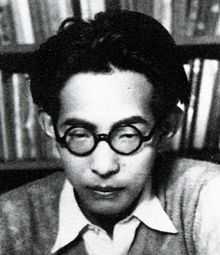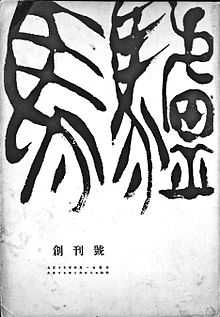Tatsuo Hori
| Tatsuo Hori | |
|---|---|
 Hori Tatsuo | |
| Born |
28 December 1904 Tokyo, Japan |
| Died |
28 May 1953 (aged 48) Nagano, Japan |
| Occupation | Writer |
| Genres | Poetry, translations of French poetry |
| Literary movement | Proletarian Literature Movement, modernism |
Tatsuo Hori (堀 辰雄 Hori Tatsuo, 28 December 1904 – 28 May 1953) was a writer, poet, and translator in Showa period Japan.
Early life

Hori was born in Tokyo, and was a graduate of Tokyo Imperial University. While still a student, he contributed translations of modern French poets to a literary journal called Roba, which was sponsored by poet Murō Saisei. He regarded himself as a disciple of Ryūnosuke Akutagawa, but his early works exhibit an attraction to the proletarian literary movement as viewed by his friends Nagai Tatsuo and Kobayashi Hideo. His later works reflect a movement towards modernism.
Literary career
Hori wrote a number of novelettes and poems, which are set in atmospheric locations, such as a mountain sanatorium in Nagano Prefecture, and are characterized by the melancholic theme of death, which reflect his own ongoing battle with tuberculosis. Often plotless and impressionistic, his style was praised by Kawabata Yasunari.
Hori wrote Yamatoji, a small sentimental collection of poetic essays about Nara and its historic sites. This was followed by Adashino, a tragic romance set in the Nara period. His beautiful descriptions of Nara and the world of the ancient capital have been popularized by the tourist authorities in that city. The town of Karuizawa, Nagano prefecture, where Hori stayed during his illness, established the Hori Tatsuo Memorial Museum in his honor. His grave is at Tama Reien, a cemetery in the outskirts of Tokyo.
Major works
- Sei Kazoku (The Holy Family (聖家族), 1932)
- Utsukushii Mura (Beautiful Village (美しい村), 1933)
- Kaze Tachinu (The Wind Has Risen (風立ちぬ), 1936–37)
- Kagerou no Nikki (Diary Of Mayfly (かげろふの日記), 1937)
- Naoko (Naoko (菜穂子), 1941)
- Arano (Arano (曠野), 1941)
- Younen Jidai (Childhood (幼年時代), 1942)
See also
- Japanese literature
- List of Japanese authors
References
- Kojin, Karatani. Origins of Modern Japanese Literature. Duke University Press (1993). ISBN 0-8223-1323-5
External links
|